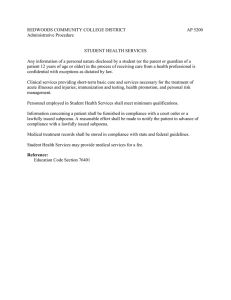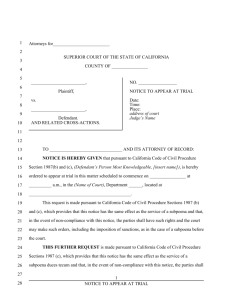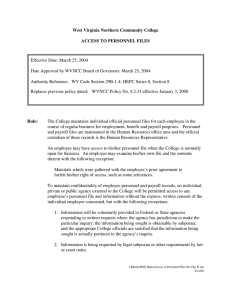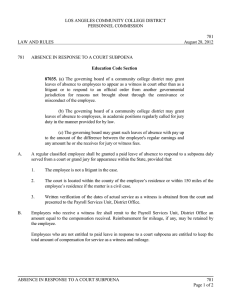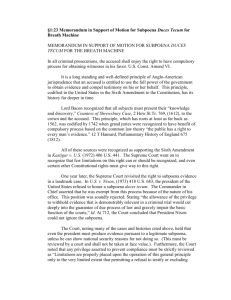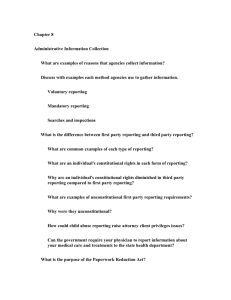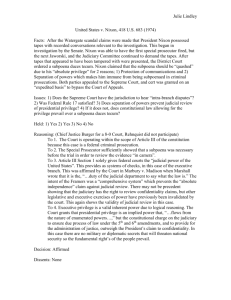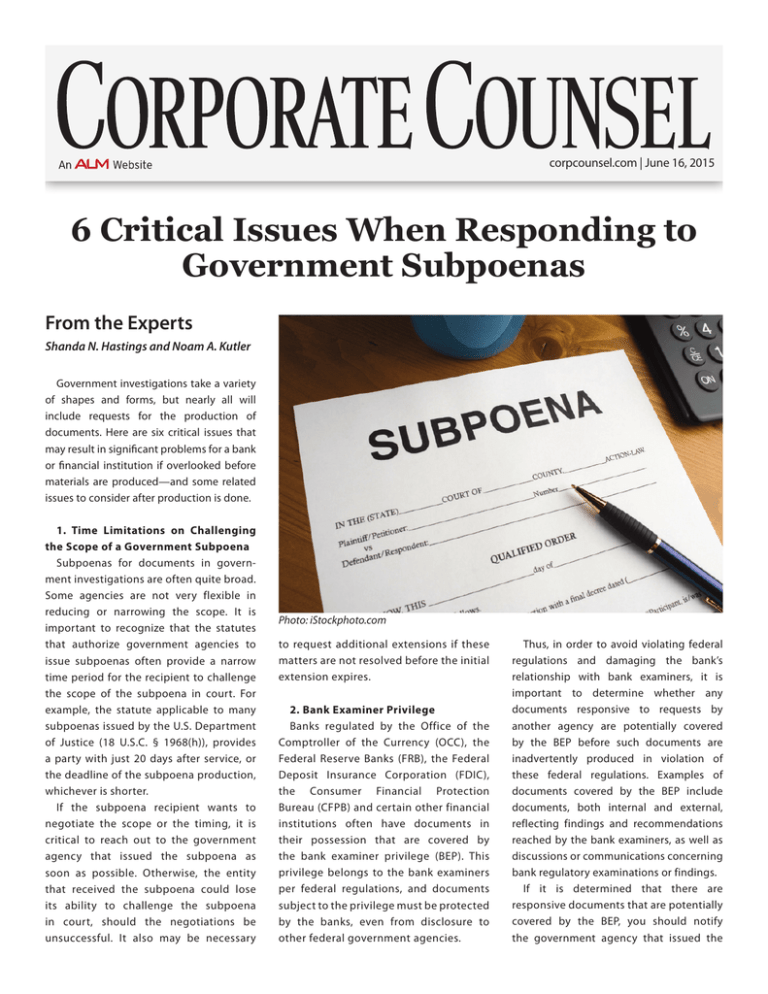
corpcounsel.com | June 16, 2015
6 Critical Issues When Responding to
Government Subpoenas
From the Experts
Shanda N. Hastings and Noam A. Kutler
Government investigations take a variety
of shapes and forms, but nearly all will
include requests for the production of
documents. Here are six critical issues that
may result in significant problems for a bank
or financial institution if overlooked before
materials are produced—and some related
issues to consider after production is done.
1. Time Limitations on Challenging
the Scope of a Government Subpoena
Subpoenas for documents in government investigations are often quite broad.
Some agencies are not very flexible in
reducing or narrowing the scope. It is
important to recognize that the statutes
that authorize government agencies to
issue subpoenas often provide a narrow
time period for the recipient to challenge
the scope of the subpoena in court. For
example, the statute applicable to many
subpoenas issued by the U.S. Department
of Justice (18 U.S.C. § 1968(h)), provides
a party with just 20 days after service, or
the deadline of the subpoena production,
whichever is shorter.
If the subpoena recipient wants to
negotiate the scope or the timing, it is
critical to reach out to the government
agency that issued the subpoena as
soon as possible. Otherwise, the entity
that received the subpoena could lose
its ability to challenge the subpoena
in court, should the negotiations be
unsuccessful. It also may be necessary
Photo: iStockphoto.com
to request additional extensions if these
matters are not resolved before the initial
extension expires.
2. Bank Examiner Privilege
Banks regulated by the Office of the
Comptroller of the Currency (OCC), the
Federal Reserve Banks (FRB), the Federal
Deposit Insurance Corporation (FDIC),
the Consumer Financial Protection
Bureau (CFPB) and certain other financial
institutions often have documents in
their possession that are covered by
the bank examiner privilege (BEP). This
privilege belongs to the bank examiners
per federal regulations, and documents
subject to the privilege must be protected
by the banks, even from disclosure to
other federal government agencies.
Thus, in order to avoid violating federal
regulations and damaging the bank’s
relationship with bank examiners, it is
important to determine whether any
documents responsive to requests by
another agency are potentially covered
by the BEP before such documents are
inadvertently produced in violation of
these federal regulations. Examples of
documents covered by the BEP include
documents, both internal and external,
reflecting findings and recommendations
reached by the bank examiners, as well as
discussions or communications concerning
bank regulatory examinations or findings.
If it is determined that there are
responsive documents that are potentially
covered by the BEP, you should notify
the government agency that issued the
June 16, 2015
subpoena and inquire if it is still demanding
production of those documents after
learning that the documents contain
protected material. If the BEP documents
cannot be excluded from the subpoena
through negotiation, then you must notify
the relevant bank examiner that such
documents have been requested. In some
cases, the government agency requesting
the materials may accept a production
from which the BEP material has been
logged and redacted or withheld. If so,
it is prudent to send the log to the bank
examiners before production and seek
their permission to produce the log and
any redacted materials. If the government
agency requesting the documents insists
on receiving the BEP materials, bank
examiners must be provided with an
opportunity to decide whether they will
assert the privilege over those documents.
3. The Bank Secrecy Act
Similarly, the U.S. Department of Treasury
Financial Crimes Enforcement Network
(FinCEN) has set forth stringent limitations
on the production of documents covered
by the Bank Secrecy Act (BSA), including
documents related to Suspicious Activity
Reports (SARs), Currency Transaction
Reports (CTRs) and other reports.
In circumstances where the federal
regulations allow for the production of
BSA materials to another government
agency, the documents containing BSA
information must be segregated from
other materials produced in response to a
request from a government agency (e.g.,
produced on a separate disc or hard drive),
and the documents and the separate disc
or hard drive must be clearly labeled as
containing BSA confidential information.
4. The Right to Financial Privacy Act
The Right to Financial Privacy Act (RFPA)
prevents financial institutions and their
employees and agents from providing
any agency or department of the federal
government with access to the information
contained in the financial records of certain
of its customers—unless the government
agency seeking such records certifies
in writing to the financial institution
that it has complied with the applicable
provisions of RFPA. Failure to do so could
result in liability to the customer(s) by the
financial institution and its employees and
agents. The term “financial record” has
been interpreted broadly by the courts
and includes obvious financial records,
such as loan files and account statements,
but may cover company records that list
information related to customer financial
records, such as loan lists or loan tapes.
Before producing documents to the
federal government, it is important to
analyze whether the entity producing
the documents is covered by RFPA and
whether the production will include
covered customer financial records. If so,
it is important to get the required RFPA
certification from the government agency
first—unless the government agency
proactively included a certification with
its subpoena.
5. Hidden Data
In today’s world of voluminous
e-discovery, reviewers can inadvertently
overlook the fact that hidden data, such
as tracked changes, hidden Excel rows and
worksheets, PowerPoint notes, and notes
in Outlook calendar invites are contained
in documents. The hidden data may
contain privileged or sensitive information
and can lead to the inadvertent production
of privileged material or cause reviewers
to fail to identify key information.
In many cases, the vendor that maintains
the document review database can include
fields in the review database that will alert
reviewers to the existence of such hidden
data so they can open the document in
native format and examine it. It is crucial to
highlight in training materials and training
sessions the importance of reviewing
hidden data in documents that may be
responsive to government agency requests.
6. Issues that Can Arise Months and
Years After the Subpoena Response
You should continue to monitor the
government agency’s investigation even
after the bank or financial institution is
no longer involved in the investigation.
In some instances, documents produced
to the government may be used
during related third-party litigation as
exhibits and, as a result, may become
publicly available. In such cases, the
protections sought under the Freedom of
Information Act (FOIA) may not ensure the
confidentiality of the documents.
Documents
produced
to
the
government may include highly sensitive
business documents and customer or
employee data that could cause business
and reputational harm to the banks and
financial institutions, if made public. It is
important to be vigilant and ensure that
sensitive customer and employee data
is being protected appropriately in such
litigation and to seek a protective order,
when appropriate, to ensure the continued
confidentiality of sensitive documents
provided in response to investigative
requests by a government agency.
Shanda N. Hastings, a partner in K&L
Gates’ government enforcement practice,
represents banks and other financial
institutions, public and private companies,
corporate officers and directors, compliance
personnel and accountants in enforcement
proceedings and examinations before
federal and state government agencies and
in related litigation. She also specializes in
internal investigations. Noam A. Kutler, an
associate in the firm’s Washington, D.C.,
office, focuses his practice primarily on
civil litigation, including false claims act
litigation and representing clients before
enforcement agencies.
Reprinted with permission from the June 16, 2015 edition of
CORPORATE COUNSEL © 2015 ALM Media Properties, LLC.
This article appears online only. All rights reserved. Further
duplication without permission is prohibited. For information,
contact 877-257-3382 or reprints@alm.com. # 016-06-15-10

